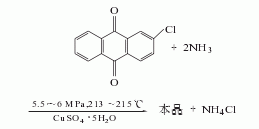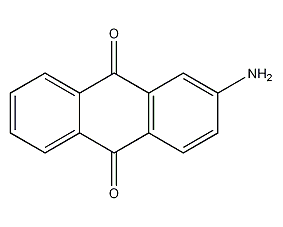2-Aminoanthraquinone


Structural formula
| Business number | 0397 |
|---|---|
| Molecular formula | C14H9NO2 |
| Molecular weight | 223.23 |
| label |
β-Aminoanthraquinone, β-Aminoanthraquinone, catalyst, Aromatic nitrogen-containing compounds and their derivatives |
Numbering system
CAS number:117-79-3
MDL number:MFCD00001233
EINECS number:204-208-4
RTECS number:CB5120000
BRN number:745903
PubChem number:24850139
Physical property data
1. Properties: red or orange-brown needle-like crystals.
2. Density (g/mL, 25/4℃): Undetermined
3. Relative vapor density (g/mL, air=1): Undetermined
4. Melting point (ºC): 303~306
5. Boiling point (ºC, normal pressure): Undetermined
6. Boiling point (ºC, 5.2kPa): Undetermined
7. Refractive index: Undetermined
8. Flash point (ºC): Undetermined
9. Specific rotation (º): Undetermined Determined
10. Autoignition point or ignition temperature (ºC): Not determined
11. Vapor pressure (kPa, 25ºC): Not determined
12. Saturated vapor pressure (kPa, 60ºC): Undetermined
13. Heat of combustion (KJ/mol): Undetermined
14. Critical temperature (ºC): Undetermined
15. Critical pressure (KPa): Undetermined
16. Log value of oil-water (octanol/water) partition coefficient: Undetermined
17. Explosion upper limit ( %, V/V): Undetermined
18. Lower explosion limit (%, V/V): Undetermined
19. Solubility: Insoluble in water, slightly soluble in ethanol , soluble in ether, chloroform, chlorobenzene, acetone, benzene, nitrobenzene and concentrated sulfuric acid.
Toxicological data
Poisonous. It has an irritating effect on the nasal mucosa. Long-term exposure can easily cause dermatitis and gastric indigestion. Rats developed failure after inhaling 10mg/m3 for 4 months. The maximum allowable concentration in the air in the operating place is 5 mg/m3. The production workshop should be ventilated, equipment should be sealed, and operators should wear protective equipment.
Ecological data
Slightly harmful to water.
Molecular structure data
1. Molar refractive index: 62.90
2. Molar volume (cm3/mol): 161.3
3. Isotonic specific volume (90.2K ): 462.7
4. Surface tension (dyne/cm): 67.6
5. Polarizability (10-24cm3): 24.93
Compute chemical data
1. Reference value for hydrophobic parameter calculation (XlogP): None
2. Number of hydrogen bond donors: 1
3. Number of hydrogen bond acceptors: 3
4. Number of rotatable chemical bonds: 0
5. Number of tautomers: 5
6. Topological molecule polar surface area 60.2
7. Number of heavy atoms: 17
8. Surface charge: 0
9. Complexity: 352
10. Number of isotope atoms: 0
11. Determine the number of atomic stereocenters: 0
12. Uncertain number of atomic stereocenters: 0
13. Determine the number of chemical bond stereocenters: 0
14. Number of uncertain chemical bond stereocenters: 0
15. Number of covalent bond units: 1
Properties and stability
1. Stable at room temperature and pressure, avoid contact with strong oxidants.
Toxic. It has an irritating effect on the nasal mucosa. Long-term exposure can easily cause dermatitis and gastric indigestion. Rats developed failure after inhaling 10mg/m for 34 months. The maximum allowable concentration in the air in the operating place is 5 mg/m3. The production workshop should be ventilated, equipment should be sealed, and operators should wear protective equipment.
2. It may cause irreversible damage to the body. Avoid inhaling the dust of this product and avoid contact with eyes and skin.
Storage method
1. Store in a cool, ventilated warehouse. Keep away from fire and water sources. should be kept away from oxidizer, do not store together. Equipped with the appropriate variety and quantity of fire equipment. Suitable materials should be available in the storage area to contain spills.
Packaged in iron drums lined with plastic bags, with a net weight of 30 to 100kg per drum. Store in a ventilated and dry place. Sun protection and moisture-proof. Store and transport according to regulations on toxic substances.
Synthesis method
Prepared by ammoniation of anthraquinone-2-sulfonate ammonium salt, the process is as follows: 240kg of anthraquinone-2-sulfonate ammonium salt, 70kg of sodium m-nitrobenzene sulfonate (anti-staining salt S) and 25 % ammonia water (174kg containing 100% ammonia) is beaten and pressed into the autoclave. Heat to 184-188°C, the pressure is 3.73-3.92MPa (gauge pressure), keep the reaction pressure for 10 hours, after the reaction is completed, cool and release ammonia. Cool to 80°C, press the material into a deamination pot and deaminate at 80°C for 2 hours. Raise the temperature to 100°C, filter with suction, and wash with 3000L of 100°C hot water. Dry the filter cake to obtain 2-aminoanthraquinone. The yield is 70%. (2) 2-Chloroanthraquinone and ammonia are reacted in a suspension of catalyst copper sulfate under high temperature and pressure to prepare 2-aminoanthraquinone. First, beat 2-chloroanthraquinone, copper sulfate, and ammonia water, mix them thoroughly and press them into an ammoniation pressure cooker, raise the temperature to 213-215°C, react at a pressure of 5.1-5.39MPa for 5 hours, and release the pressure to recover the remaining ammonia. The reaction product is pressed into the filter, filtered, washed, and dried to obtain the finished product. Product specifications: Appearance is reddish brown powder with an industrial product content (based on total ammonia value) of 86.0%.

Purpose
Used to prepare Vat Blue RSN, Vat Blue BC, Vat Yellow 5RC, Vat Yellow G, Vat Yellow 8G, etc. Also used to prepare 1-chloro-2-aminoanthraquinone dye. It can be used as a catalyst in the paper industry to save caustic soda.
